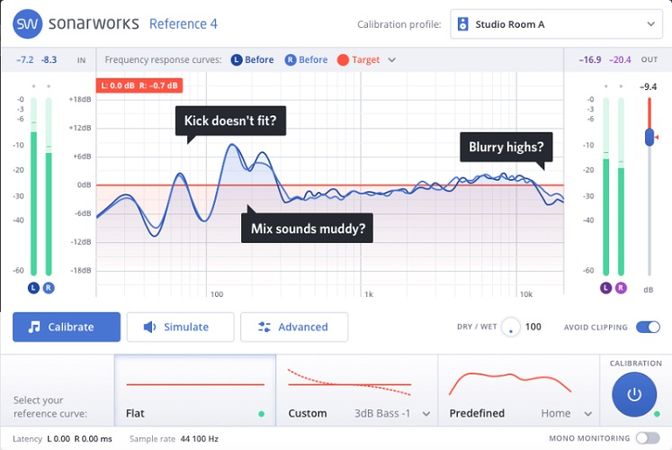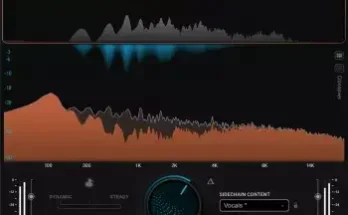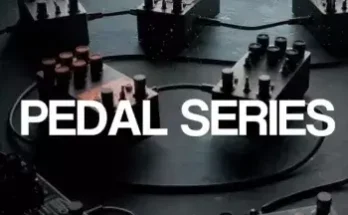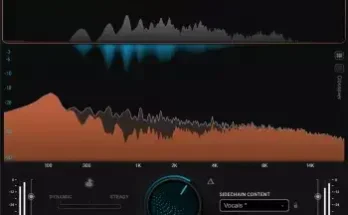Reference 4 Studio Edition v4.4.7 WIN-R2R
Team R2R | 14 Mar 2021 | 431.0MB
Finally you can work with confidence on the setup you have. Sonarworks Reference 4 removes unwanted coloration from your studio speakers and headphones, so you can trust that you hear your mix accurately.
Reference 4 Studio Edition offers the full package of highly powerful software, providing consistent reference sound both in the studio and on the go. Measure your studio with a measurement mic, it takes around 10 minutes. Reference 4 then creates a calibration profile. For headphones select a pre-made profile, and you’re ready to go. Calibration can be run in DAW via plugin for lowest latency or via Systemwide for maximum versatility.
Speaker calibration. The most accurate speaker and room calibration software that delivers reference sound you can trust.
Most speakers do a decent job in a lab, but once you bring them into your room, things change. The sound you hear degrades due to room acoustics. Thus you miss critical details, and lose the ability to put your skills to their best use.
Sonarworks Reference 3 solves this problem of lost accuracy and makes translation to other systems much better. It is a software tool that combines a measurement software with calibration DAW plug-in. The plug-in serves as an advanced DSP for your monitors that neutralises room influence.
Think of Sonarworks Reference 3 as a professional acoustician that tunes your studio.
Accurate sound from your studio monitors is of utmost importance for making the right mixing decisions. Reference 3 speaker calibration allows you to hear even the smallest detail with ear-opening accuracy. Eliminate guesswork.
HOW IT WORKS
Reference 3: Quick to set up, easy to use.
1. Measure your room
Measure the room acoustics following the simple step-by-step process in our software.
2. Enable calibration
Open the calibration profile in DAW plug-in or Systemwide.
3. Enjoy calibrated sound
Find out what you’ve been missing. Brag about it!
The acoustic measurement of speakers involves a revolutionary measurement concept that calculates perceived acoustic power frequency response (PAPFR), and error-proof automatic microphone positioning system (AMPS).
Reference Systemwide upgrade calibrates all of your outgoing audio. Finally a dependable sound standard is now available outside of DAW for seamless production and referencing. No more dragging files into your DAW project just to have a listen or figuring out how to check if your kick blasts as hard as the best of them on Soundcloud.
Response Curve view
Add or remove various frequency response curve visualizations to your frequency graph. See your room sound before and after the correction, look at your left and right driver response individually or follow your overall phase alignment while using different filter modes.
Reference Curve Presets
Enhance your mixing and listening experience by choosing between our predefined reference curves and speaker simulations. Reference, guide and choose between several popular speaker simulations by tilting, adding or decreasing some bottom end.
Reference sound everywhere
Reference 4 Systemwide allows using calibrated sound for critical listening from any playback source. No more dragging files into your DAW project just to have a listen or figuring out how to check if your kick blasts as hard as the best of them on Soundcloud.
Mono Monitoring
Mono never left! There is a handy option to switch your mix to mono, but still maintaining a stereo correction, giving you an easy way to check if your mix will sound good in mono as well.
Avoid clipping
Our Audio Calibration Engine boosts some frequencies to fill in the frequency response dips, and to make your speakers sound precise. By flipping the “avoid clipping” switch you will ensure that your audio output does not get become distorted when calibrated.
Dry/Wet control
This is not a conventional Dry/Wet knob that is used to mix the effect in parallel! The correction curve is actually being smoothed out when you raise or lower this knob to gradually reduce or increase the effect of a calibration.
Formats: AAX, RTAS, VST, SAL




